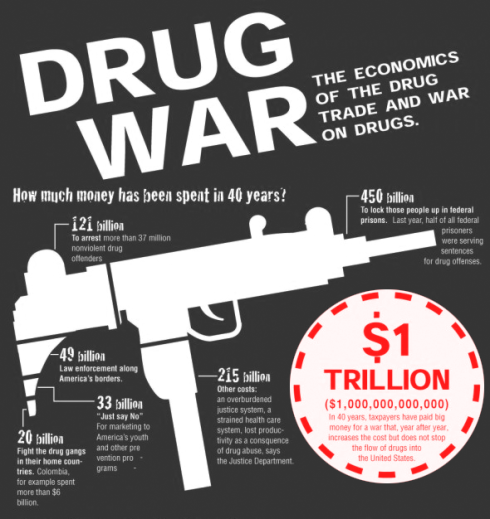CIA “Manages” Drug Trade, Mexican Official Says
July 29, 2012
By ALEX NEWMAN | THE NEW AMERICAN | JULY 29, 2012
The Central Intelligence Agency’s involvement in drug trafficking is back in the media spotlight after a spokesman for the violence-plagued Mexican state of Chihuahua became the latest high-profile individual to accuse the CIA, which has been linked to narcotics trafficking for decades, of ongoing efforts to “manage the drug trade.” The infamous American spy agency refused to comment.
In a recent interview, Chihuahua state spokesman Guillermo Terrazas Villanueva told Al Jazeera that the CIA and other international “security” outfits “don’t fight drug traffickers.” Instead, Villanueva argued, they try to control and manage the illegal drug market for their own benefit.
“It’s like pest control companies, they only control,” Villanueva told the Qatar-based media outlet last month at his office in Juarez. “If you finish off the pests, you are out of a job. If they finish the drug business, they finish their jobs.”
Another Mexican official, apparently a mid-level officer with Mexico’s equivalent of the U.S. Department of “Homeland Security,” echoed those remarks, saying he knew that the allegations against the CIA were correct based on talks with American agents in Mexico. “It’s true, they want to control it,” the official told Al Jazeera on condition of anonymity.
Credibility issues with employees of the notoriously corrupt Mexican government aside, the latest accusations were hardly earth shattering — the American espionage agency has been implicated in drug trafficking from Afghanistan to Vietnam to Latin America and everywhere in between. Similar allegations of drug running have been made against the CIA for decades by former agents, American officials, lawmakers, investigators, and even drug traffickers themselves.
Some of the most prominent officials to level charges of CIA drug trafficking include the former head of the U.S. Drug Enforcement Administration (DEA), Robert Bonner. During an interview with CBS, Bonner accused the American “intelligence” outfit of unlawfully importing a ton of cocaine into the U.S. in collaboration with the Venezuelan government.
Even the New York Times eventually covered part of the scandal in a piece entitled “Anti-Drug Unit of C.I.A. Sent Ton of Cocaine to U.S. in 1990.” And the agency’s Inspector General, Frederick Hitz, was eventually forced to concede to a congressional committee that the CIA has indeed worked with drug traffickers and obtained a waiver from the Department of Justice in the 1980s allowing it to conceal its contractors’ illicit dealings.
An explosive investigation by reporter Gary Webb dubbed the “Dark Alliance” also uncovered a vast CIA machine to ship illegal drugs into the U.S. to fund clandestine and unconstitutional activities abroad, including the financing of armed groups. Webb eventually died under highly suspicious circumstances — two gunshots to the head, officially ruled a “suicide.”
Responding to Webb’s discoveries, top officials and even lawmakers eventually acknowledged that the CIA almost certainly had a role in illegal drug trafficking. “There is no question in my mind that people affiliated with, or on the payroll of, the CIA were involved in drug trafficking,” explained U.S. Senator John Kerry (D-Mass.) after the Dark Alliance series.
Top-level Mexican officials have suggested complicity by U.S. officials in drug trafficking as well — even recently. “It is impossible to pass tons of drugs or cocaine to U.S. without some grade of complicity of some American authorities,” observed Mexican President Felipe Calderon in a 2009 interview with the BBC.
Last year, an explosive report in the Washington Times, citing a CIA source, speculated that the agency may be deliberately helping certain Mexican cartels to beat out others for geopolitical purposes. According to the sources, the intelligence outfit might have also played a key role in the now-infamous Fast and Furious scandal, which saw the federal government providing thousands of high-powered weapons to Mexican cartels.
Shortly before that, The New American reported on federal court filings by a top Sinaloa Cartel operative that shed even more insight on the U.S. government’s role in drug trafficking. The accused “logistical coordinator” for the cartel, Jesus Vicente “El Vicentillo” Zambada-Niebla, claimed that he had an agreement with top American officials: In exchange for information on rival cartels, the deal supposedly gave him and his associates immunity to import multi-ton quantities of drugs across the border.
“Indeed, United States government agents aided the leaders of the Sinaloa Cartel,” the court filing states. Zambada-Niebla is currently being held in federal prison, but he argues that he is innocent because he had approval from — and collaborated with — U.S. agencies in his illegal drug-trafficking operations.
Another expert who spoke with Al Jazeera, a university professor, also indicated that the American federal government was deeply involved in the drug trafficking business. He said the drug war was an “illusion” aimed at justifying control of populations and intervention in Latin America. As evidence, he pointed to the fact that one of the top drug kingpins in the world — billionaire “El Chapo” of the Sinaloa cartel — operates openly and with impunity.
Numerous drug bosses and American officials have made similar claims, alleging that the U.S. government in essence controls at least some of the cartels. According to former DEA operative and whistleblower Celerino Castillo, American federal authorities have even been training members of the brutal Los Zetas cartel in Texas.
CIA and DEA insider Phil Jordan, meanwhile, publicly claimed last year that the Obama administration was selling military-grade weaponry to the deadly organization through a front company in Mexico. And with the Fast and Furious scandal, it emerged that the Obama administration was using tax money to arm Mexican cartels, then exploiting the ensuing violence to attack the Second Amendment.
The President and his Department of Justice have been engaged in a cover-up since whistleblowers first exposed the scheme more than a year ago, leading Congress to hold disgraced Attorney General Eric Holder in contempt. Another congressional investigation being obstructed by the Justice Department surrounds DEA drug-money laundering operations revealed in an explosive New York Times article late last year.
“While the quality of the involvement of the CIA and other security agencies may be debatable, it is impossible to excise the blame from America,” noted an analysis about the latest allegations published by Catholic Online. “If the CIA is part of the problem, then it will only be one more sign of the corruption and evil that pervades American and Mexican politics and holds hostage millions of innocents.”
Some 50,000 people have died just in recent years as part of Mexico’s U.S. government-backed “war on drugs,” and anger south of the border continues to build. But even as Latin American leaders openly debate legalization and threaten to defect from the controversial “war,” the Obama administration has promised to continue showering taxpayer money on regimes that expand the battle.
Meanwhile, as the bloodshed continues to spiral out of control, the U.S. border remains virtually wide open on purpose, according to experts. And despite tens of billions spent on the endless “war,” numerous analyses indicate that the flow of illegal drugs into America is actually growing — not to mention consumption. By contrast, Portugal, which legalized all drugs about a decade ago, has seen declining rates of addiction, drug abuse, and crime.
In the United States, pressure is still growing on both sides of the aisle to reform or end the unconstitutional federal drug war once and for all, with polls showing rapidly declining support among voters. Over a dozen states have already nullified some unconstitutional federal statutes on marijuana as well. How long the “war” will go on, however, may depend on the federal government’s ability to continue borrowing funds to wage it.


